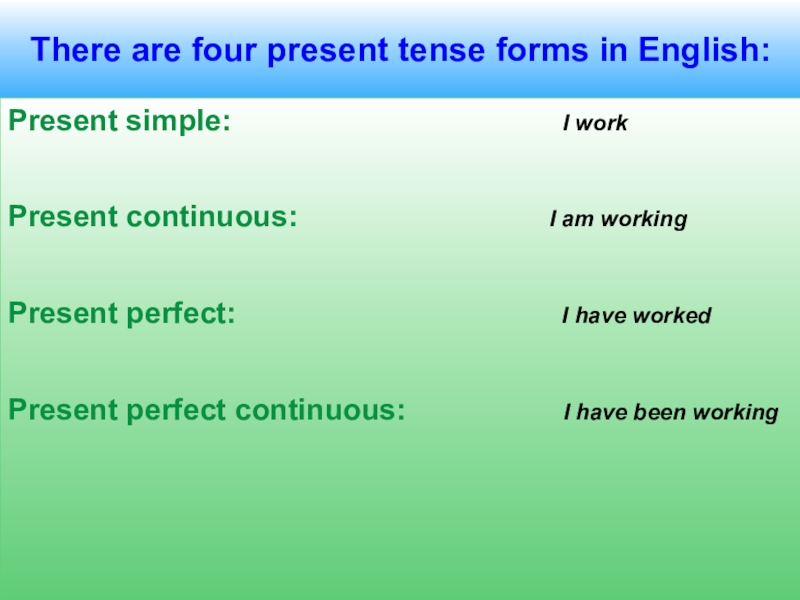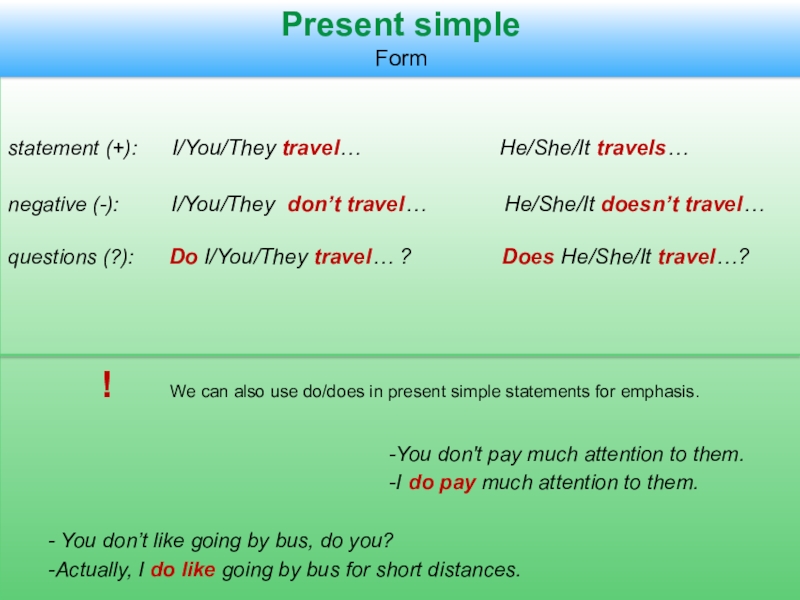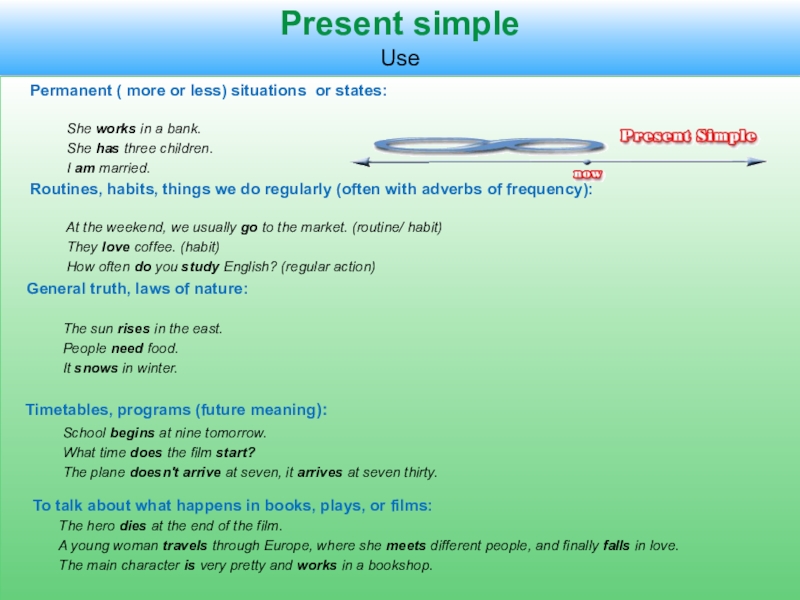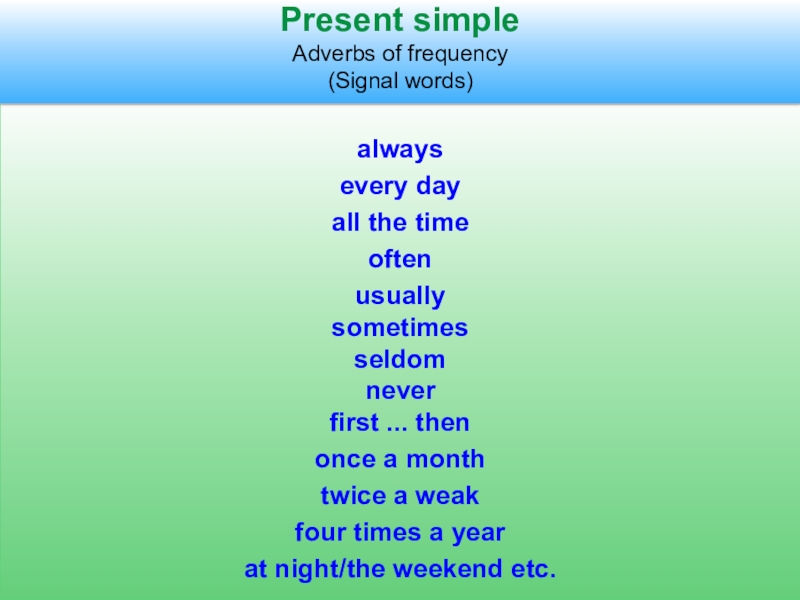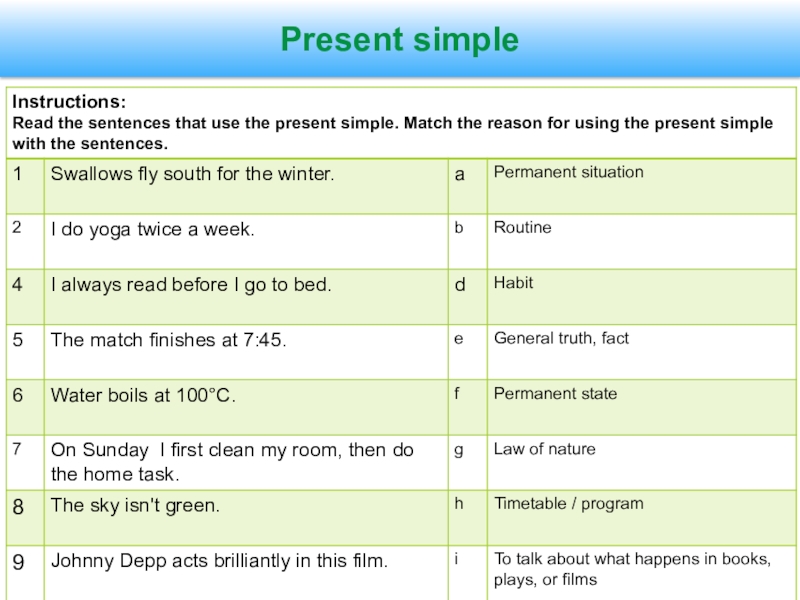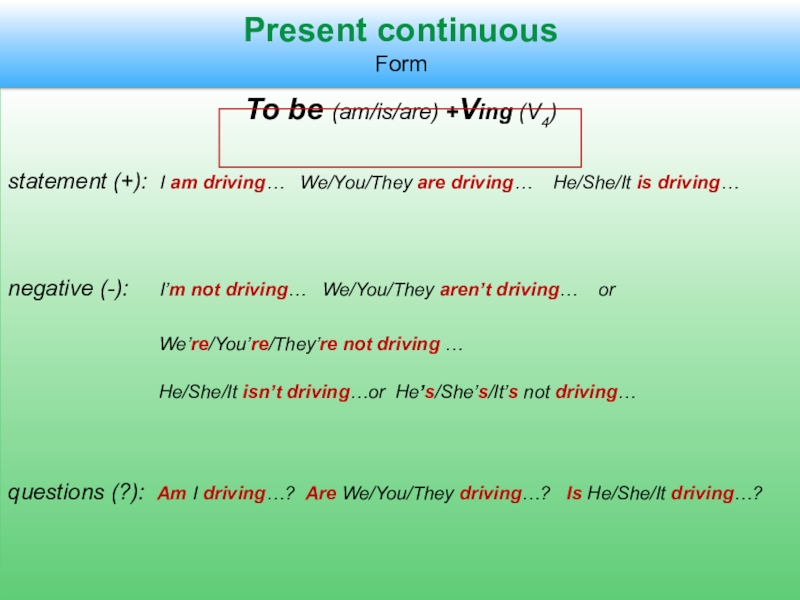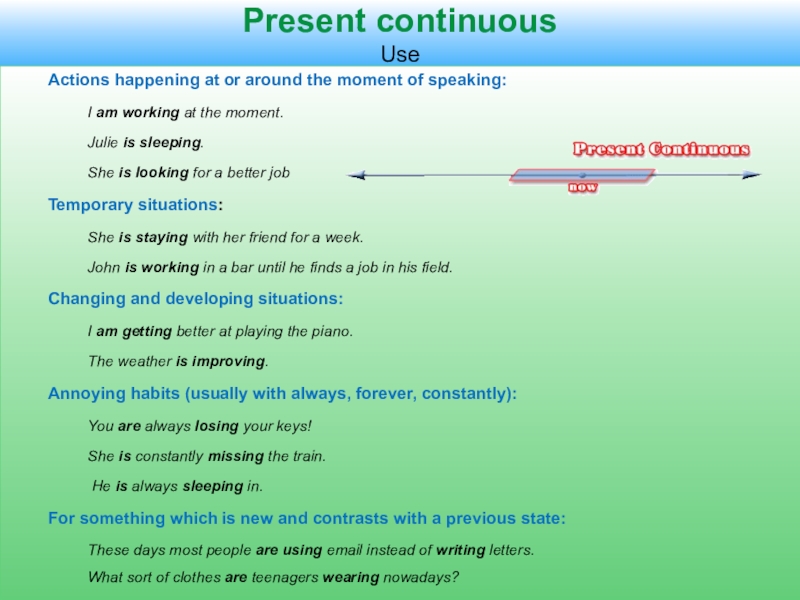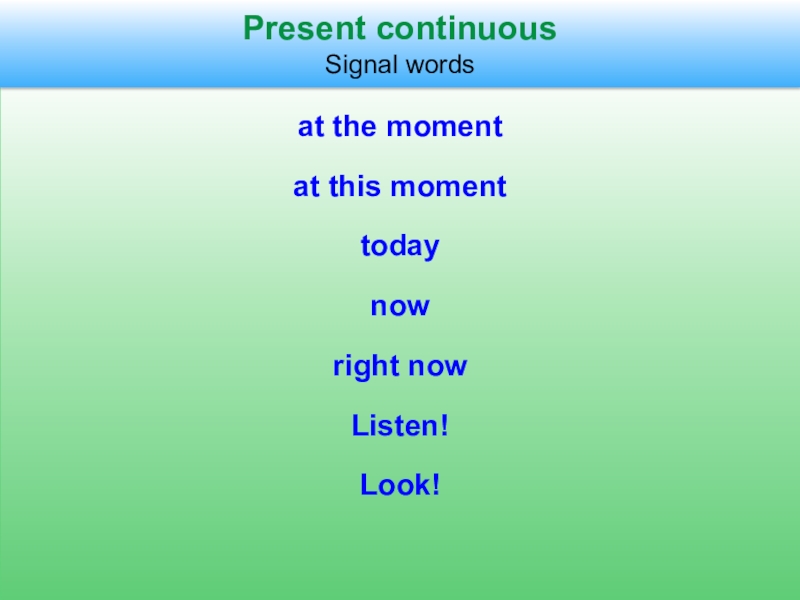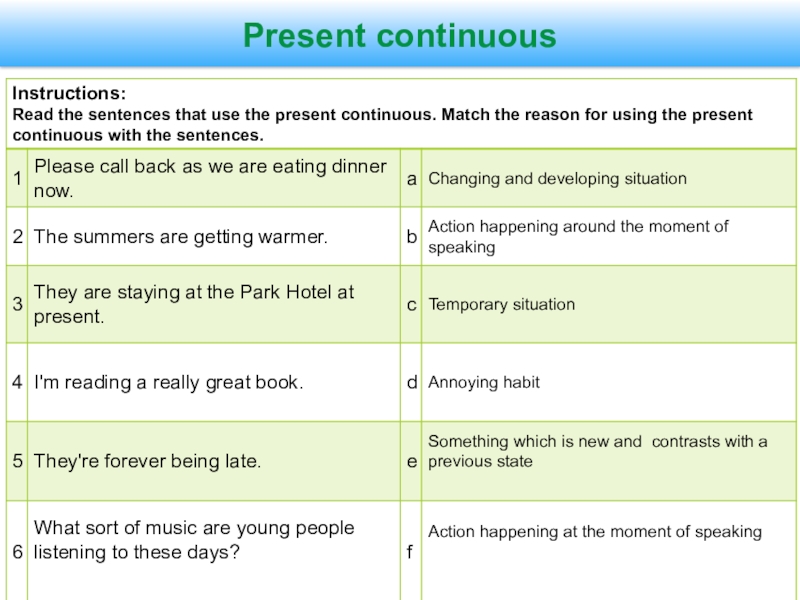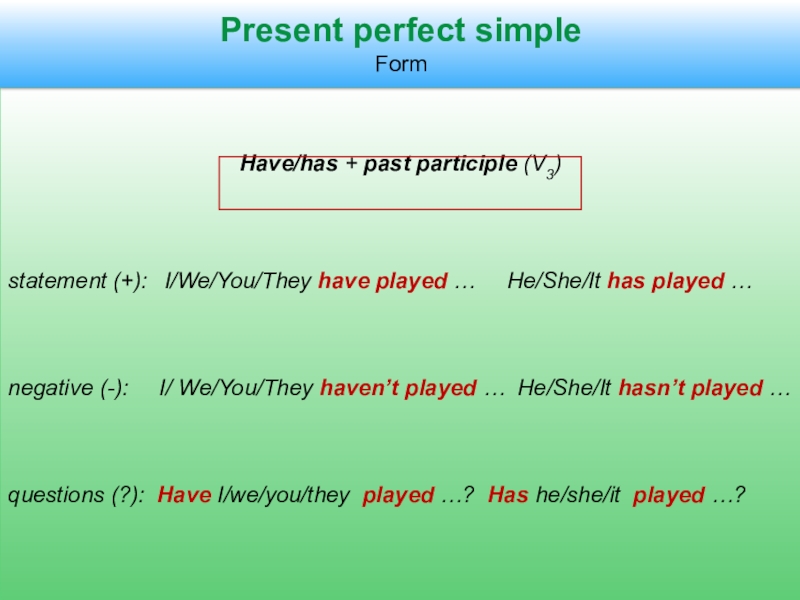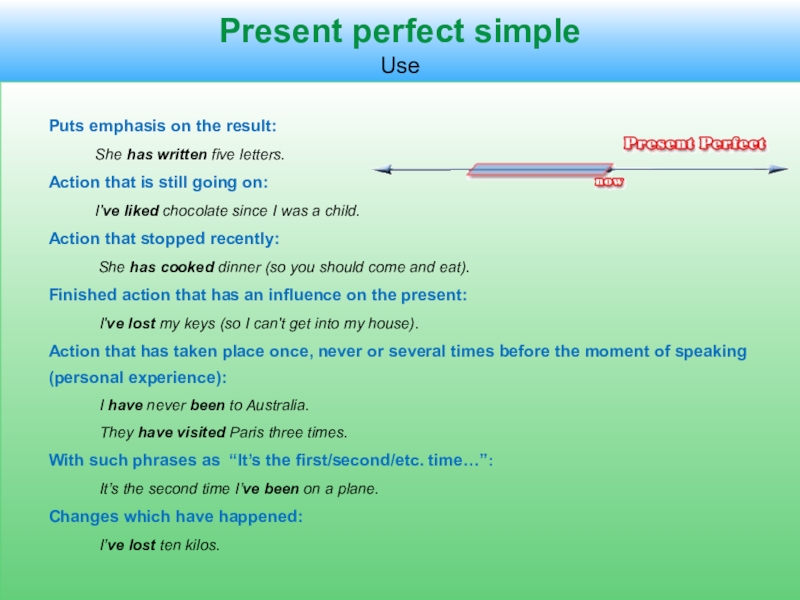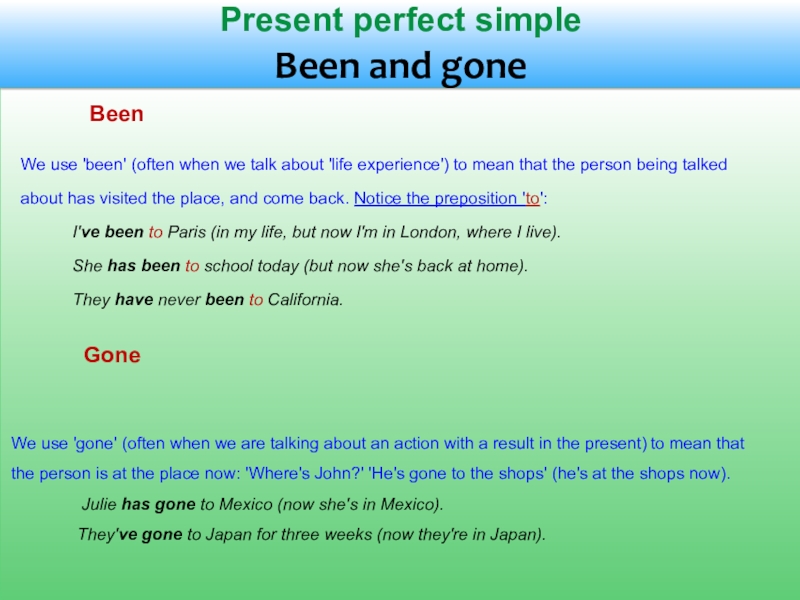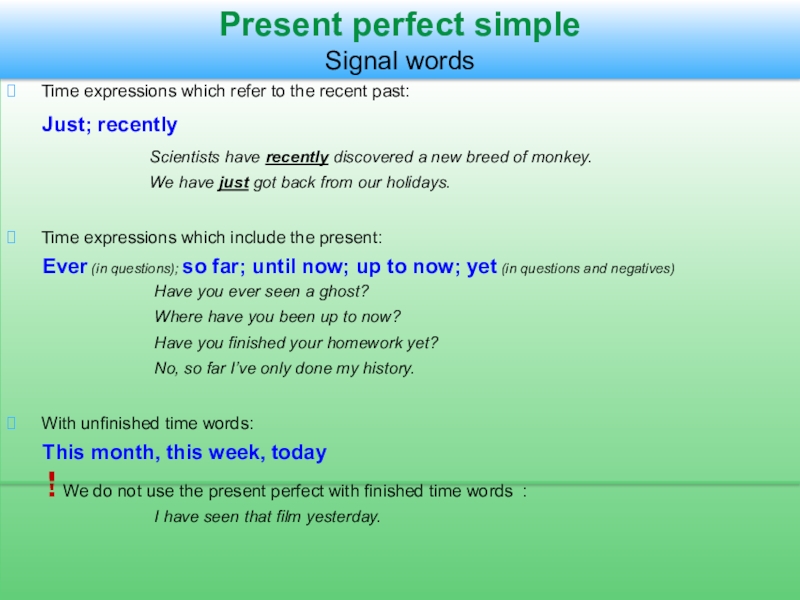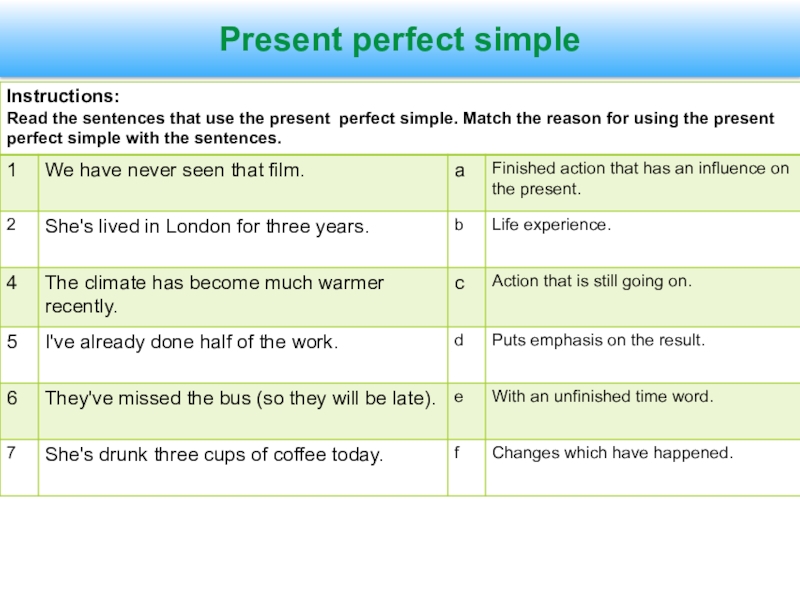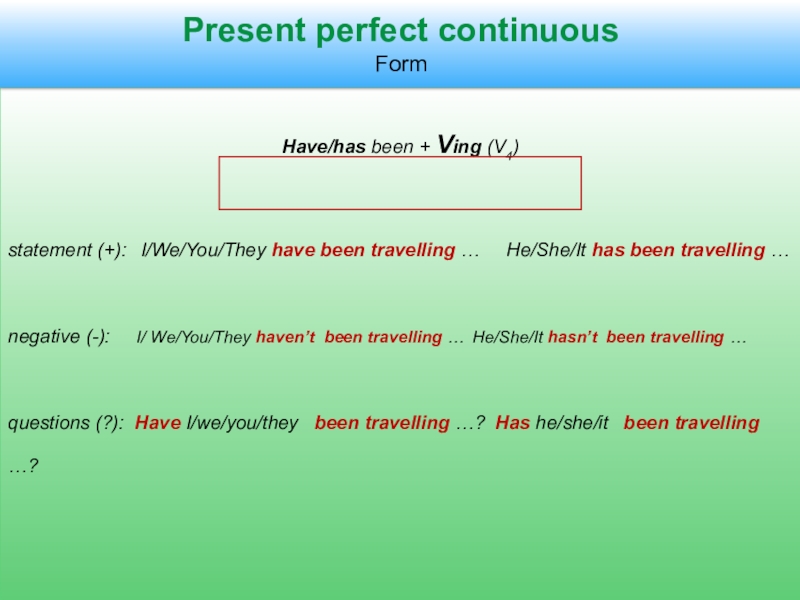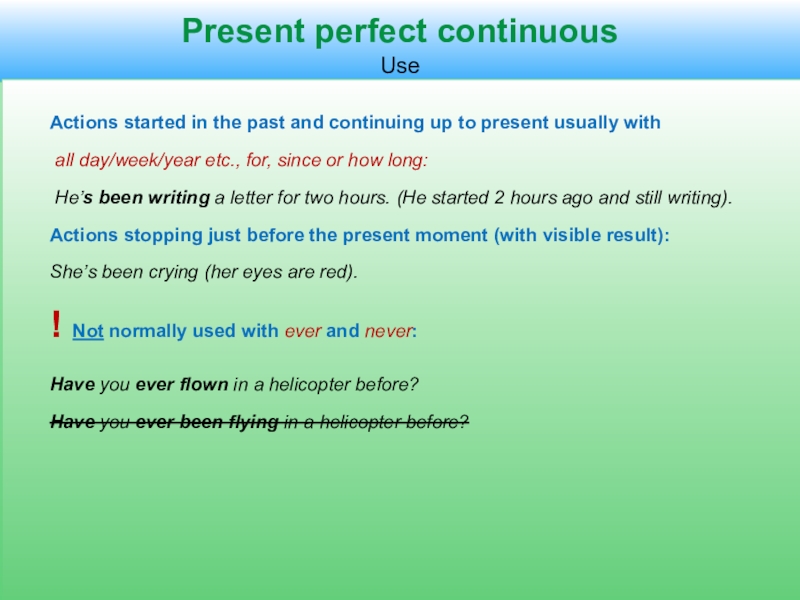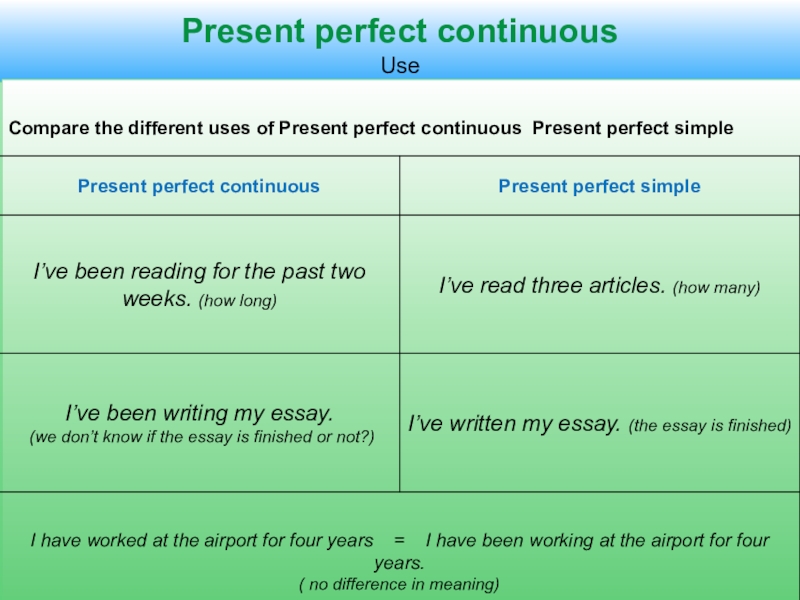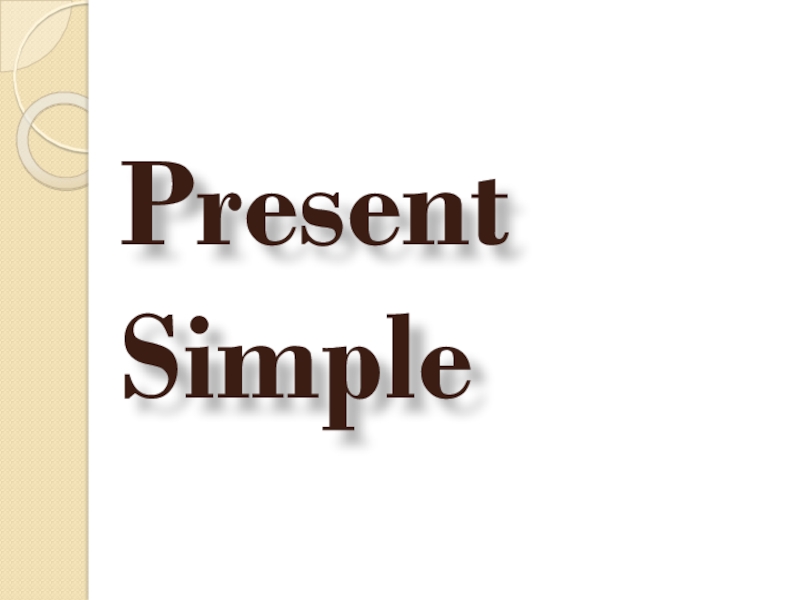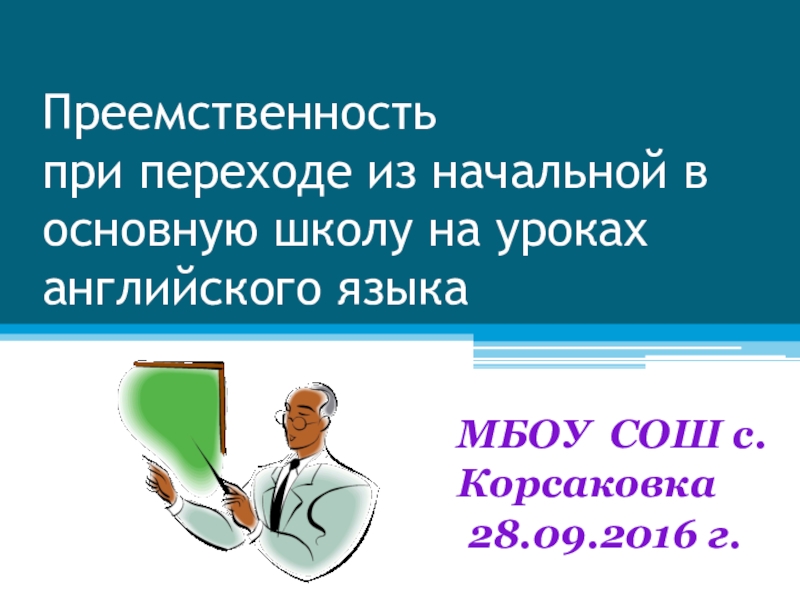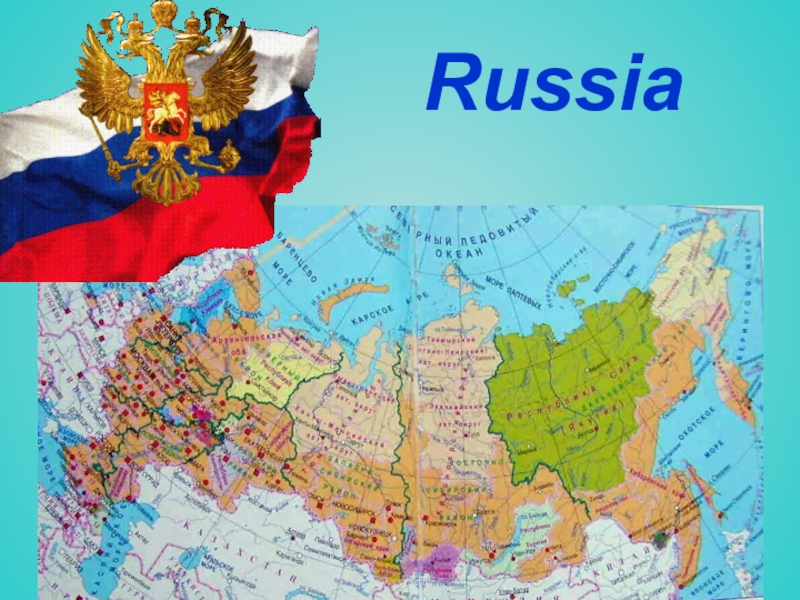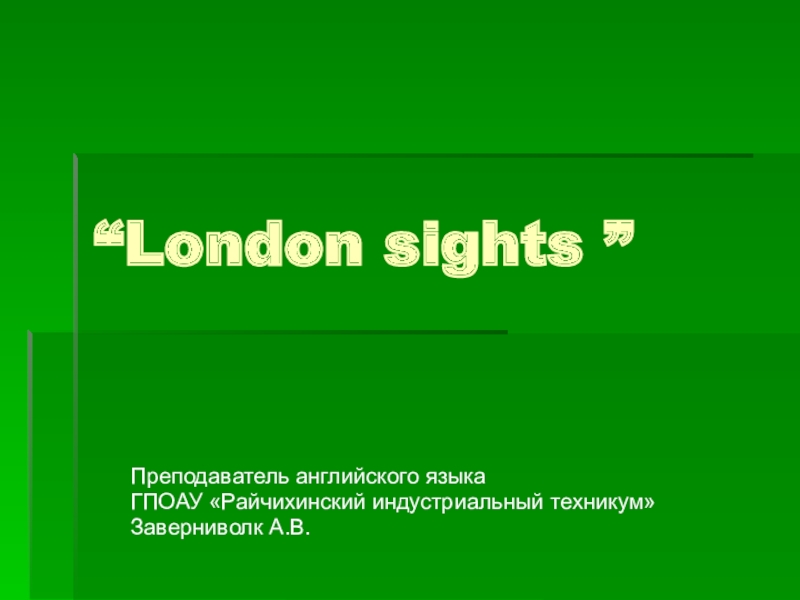- Главная
- Разное
- Образование
- Спорт
- Естествознание
- Природоведение
- Религиоведение
- Французский язык
- Черчение
- Английский язык
- Астрономия
- Алгебра
- Биология
- География
- Геометрия
- Детские презентации
- Информатика
- История
- Литература
- Математика
- Музыка
- МХК
- Немецкий язык
- ОБЖ
- Обществознание
- Окружающий мир
- Педагогика
- Русский язык
- Технология
- Физика
- Философия
- Химия
- Шаблоны, фоны, картинки для презентаций
- Экология
- Экономика
Презентация, доклад на тему Английский язык. Презентация PRESENT TENSES (intermediate/upperintermediate level)
Содержание
- 1. Английский язык. Презентация PRESENT TENSES (intermediate/upperintermediate level)
- 2. There are four present tense forms in English:Present simple:
- 3. statement (+): I/You/They travel…
- 4. Present simple Use Permanent (
- 5. alwaysevery dayall the timeoftenusually sometimes seldom never
- 6. Present simple
- 7. To be (am/is/are) +Ving (V4)statement (+): I
- 8. Present continuous UseActions happening at or around
- 9. at the momentat this momenttodaynowright nowListen!Look!Present continuous Signal words
- 10. Present continuous
- 11. Have/has + past participle (V3)statement (+): I/We/You/They
- 12. Present perfect simple Useputs emphasis on the
- 13. Present perfect simple Been and gone
- 14. Time expressions which refer to the recent past:
- 15. Present perfect simple
- 16. Have/has been + Ving (V4)statement (+): I/We/You/They
- 17. Present perfect continuous Useputs emphasis on the
- 18. Present perfect continuous Useputs emphasis on the
Слайд 2There are four present tense forms in English:
Present simple:
Present continuous: I am working
Present perfect: I have worked
Present perfect continuous: I have been working
Слайд 3
statement (+): I/You/They travel…
negative (-): I/You/They don’t travel… He/She/It doesn’t travel… questions (?): Do I/You/They travel… ? Does He/She/It travel…?
! We can also use do/does in present simple statements for emphasis.
-You don't pay much attention to them.
-I do pay much attention to them.
- You don’t like going by bus, do you?
-Actually, I do like going by bus for short distances.
Present simple
Form
Слайд 4Present simple
Use
Permanent ( more or less) situations or
She works in a bank.
She has three children.
I am married.
Routines, habits, things we do regularly (often with adverbs of frequency):
At the weekend, we usually go to the market. (routine/ habit)
They love coffee. (habit)
How often do you study English? (regular action)
General truth, laws of nature:
The sun rises in the east.
People need food.
It snows in winter.
Timetables, programs (future meaning):
School begins at nine tomorrow.
What time does the film start?
The plane doesn't arrive at seven, it arrives at seven thirty.
To talk about what happens in books, plays, or films:
The hero dies at the end of the film.
A young woman travels through Europe, where she meets different people, and finally falls in love.
The main character is very pretty and works in a bookshop.
Слайд 5
always
every day
all the time
often
usually
sometimes
seldom
never
first ... then
once a month
twice a weak
four times
at night/the weekend etc.
Present simple
Adverbs of frequency
(Signal words)
Слайд 7To be (am/is/are) +Ving (V4)
statement (+): I am driving… We/You/They
negative (-): I’m not driving… We/You/They aren’t driving… or
We’re/You’re/They’re not driving …
He/She/It isn’t driving…or He’s/She’s/It’s not driving…
questions (?): Am I driving…? Are We/You/They driving…? Is He/She/It driving…?
Present continuous
Form
Слайд 8Present continuous
Use
Actions happening at or around the moment of speaking:
I am
Julie is sleeping.
She is looking for a better job
Temporary situations:
She is staying with her friend for a week.
John is working in a bar until he finds a job in his field.
Changing and developing situations:
I am getting better at playing the piano.
The weather is improving.
Annoying habits (usually with always, forever, constantly):
You are always losing your keys!
She is constantly missing the train.
He is always sleeping in.
For something which is new and contrasts with a previous state:
These days most people are using email instead of writing letters. What sort of clothes are teenagers wearing nowadays?
Слайд 11
Have/has + past participle (V3)
statement (+): I/We/You/They have played …
negative (-): I/ We/You/They haven’t played … He/She/It hasn’t played …
questions (?): have I/we/you/they played …? has he/she/it played …?
Present perfect simple
Form
Слайд 12Present perfect simple
Use
puts emphasis on the result:
She has written five letters.
action that is
I've liked chocolate since I was a child.
action that stopped recently:
She has cooked dinner (so you should come and eat).
finished action that has an influence on the present:
I've lost my keys (so I can't get into my house).
action that has taken place once, never or several times before the moment of speaking (personal experience):
I have never been to Australia.
They have visited Paris three times.
With such phrases as “It’s the first/second/etc. time…”:
It’ the second time I’ve been on a plane.
Changes which have happened:
I’ve lost ten kilos.
Puts emphasis on the result:
She has written five letters.
Action that is still going on:
I've liked chocolate since I was a child.
Action that stopped recently:
She has cooked dinner (so you should come and eat).
Finished action that has an influence on the present:
I've lost my keys (so I can't get into my house).
Action that has taken place once, never or several times before the moment of speaking (personal experience):
I have never been to Australia.
They have visited Paris three times.
With such phrases as “It’s the first/second/etc. time…”:
It’s the second time I’ve been on a plane.
Changes which have happened:
I’ve lost ten kilos.
Слайд 14 Time expressions which refer to the recent past:
Just; recently
Time expressions which include the present:
Ever (in questions); so far; until now; up to now; yet (in questions and negatives)
Have you ever seen a ghost? Where have you been up to now? Have you finished your homework yet? No, so far I’ve only done my history.
With unfinished time words:
This month, this week, today
! We do not use the present perfect with finished time words :
I have seen that film yesterday.
Present perfect simple
Signal words
Слайд 16
Have/has been + Ving (V4)
statement (+): I/We/You/They have been travelling …
negative (-): I/ We/You/They haven’t been travelling … He/She/It hasn’t been travelling …
questions (?): have I/we/you/they been travelling …? has he/she/it been travelling …?
Present perfect continuous
Form
Слайд 17Present perfect continuous
Use
puts emphasis on the result:
She has written five letters.
action that is
I've liked chocolate since I was a child.
action that stopped recently:
She has cooked dinner (so you should come and eat).
finished action that has an influence on the present:
I've lost my keys (so I can't get into my house).
action that has taken place once, never or several times before the moment of speaking (personal experience):
I have never been to Australia.
They have visited Paris three times.
With such phrases as “It’s the first/second/etc. time…”:
It’ the second time I’ve been on a plane.
Changes which have happened:
I’ve lost ten kilos.
Actions started in the past and continuing up to present usually with
all day/week/year etc., for, since or how long:
He’s been writing a letter for two hours. (He started 2 hours ago and still writing).
Actions stopping just before the present moment (with visible result):
She’s been crying (her eyes are red).
! Not normally used with ever and never:
Have you ever flown in a helicopter before?
Have you ever been flying in a helicopter before?
Слайд 18Present perfect continuous
Use
puts emphasis on the result:
She has written five letters.
action that is
I've liked chocolate since I was a child.
action that stopped recently:
She has cooked dinner (so you should come and eat).
finished action that has an influence on the present:
I've lost my keys (so I can't get into my house).
action that has taken place once, never or several times before the moment of speaking (personal experience):
I have never been to Australia.
They have visited Paris three times.
With such phrases as “It’s the first/second/etc. time…”:
It’ the second time I’ve been on a plane.
Changes which have happened:
I’ve lost ten kilos.
Compare the different uses of Present perfect continuous Present perfect simple

